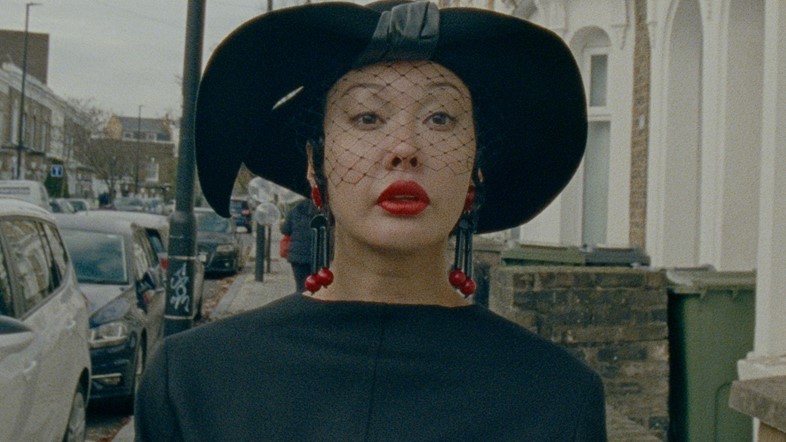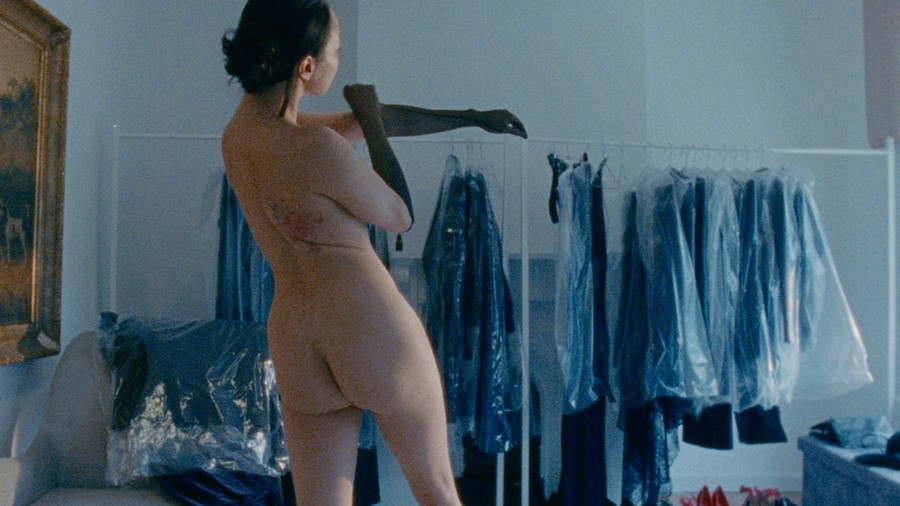Ahead of its London premiere, Ellen Pearson talks about her award-winning short film Grief Encounter: a transgressive tale of sex, death and desire
“I do what I want,” international dominatrix Eva Oh purrs deliciously as Eloise in the opening scene of filmmaker Ellen Pearson’s Grief Encounter. Part fiction, part documentary, and part skin flick, the hypnotic short film, which won Baron Books’ Baron Prize in 2022, makes its London premiere on February 16 at Fitzrovia Chapel.
Embracing the alternative, feminist pornographic filmmaking and writing of Bruce LaBruce, Anaïs Nin, Carolee Schneemann, Annie Sprinkle, and Susan Sontag, Pearson crafts the perfect protagonist for our times: a high-flying ‘vanilla’ career woman who abandons her professional aspirations in favour of an alternate kind of life, centred around the pursuit of pleasure of no ordinary kind. “I suppose you could say I’m an emotional extremist,” Oh muses in a voiceover, as Eloise performs a reverse striptease, languidly dressing her nude body in black thigh-high stockings, a black satin thong, sheer black gloves, a little black dress and a delicately fluttering black veil, her flaming red lips hungering for fresh meat.
The quintessential vamp whose taste for beauty, seduction, passion and pathos, Eloise peruses the death notices of a local paper with a practised eye of a funeral crasher. Turned on by male vulnerability, she seeks out places where men gather, openly expressing everything they’ve been conditioned to hide: pain, sadness, fear and loss. Standing face to face with the very mortality from which they run, it’s not the dead for whom they weep but for themselves.
The seeds for Grief Encounter were first planted when Pearson and screenwriter Kitty Drake began working on an idea for a film centred on stories about the sacred art of dressing and undressing in relation to sex. They imagined a film telling multiple stories. Drake interviewed Oh, who she already knew from an earlier project on latex, and it quickly became clear the new film would feature her as its star.
One night, Pearson’s friend came to dinner, and with a passing observation everything fell into place. “He is a funeral director and he was talking about how sometimes he realised he was turned on; the proximity to death and the mortality reflected in the eyes of the attendees was erotic,” says Pearson. “You know when an idea comes through, you feel all the hairs on your body stand up?”
Pearson knew the role was an extension of Oh’s personality and character. “Eva has a personal interest in the intersection between death and desire so we decided to shape the story around her. The film is ultimately a portrait of a woman unashamedly dedicating herself to her own pleasure and desire,” says Pearson, who came to filmmaking through photography as a way to tell stories about women who live against the grain.

Inspired by Oh’s professional gifts, including the ability to toy with people’s emotions, take what she wants unapologetically, and to take pleasure in other people’s discomfort, Drake revelled in the opportunity to write about a woman who makes no fuss about putting herself first, forgoing the expectations and demands of polite society and respectability politics. “I like that she lives this over-the-top, hyper-real life of leisure,” Drake says. “All she does is make herself beautiful and then go out to funerals to hunt victims. I want to live like that!”
Pearson notes that historically when it comes to representations of sexuality, women have always been the image rather than the imagemaker. “I’m very lucky to live in a time where I’m able to make work about sex and there’s support from people like Erika Lust to do that,” she says.
In Pearson’s hands, pornography becomes a playground fusing the excitement of sex and cinema into a single work. “In film, you can go into all these parts of human nature that make us uncomfortable, put it all out on the table, and examine it – and then bring it back to a joyful space, all within 20 minutes,” she says. “I think it’s imperative for women to be making work with complicated female characters that challenge preconceived ideas about sexuality and the body. I want to offer alternative reflections of women that I felt I didn’t see on the screen growing up – in the cinema and definitely not in pornography. Our heroine is a woman who lives totally in service to her lusts. How often do you see a woman doing that and come out smiling?”
Grief Encounter by Ellen Pearson makes its London premiere on February 16 and 17 at the Fitzrovia Chapel. On Thursday there will be a screening accompanied by a Q&A with Matthew Holroyd, founder of Baron Magazine. The Friday screening will be accompanied by a live score orchestrated by film choreographer Jeanie Crystal.
